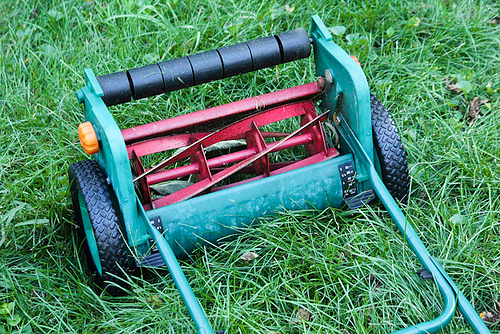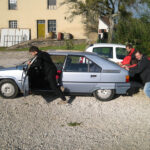When we are motivated by wisdom and compassion, the results of our actions benefit everyone… – Dalai Lama

I have one of these. Low noise, low pollution, good workout. These three are beneficial for everyone, but it's not good for large lawns.
What does that mean?
To me, this is fairly straight forward. When we act from a place of compassion, with wisdom as our guide, it is very hard to do something that doesn’t also benefit others. In other words, when our motivations are pure, not only do we help ourselves, but our actions will also help others, even if that is not directly part of the plan.
I use the word pure here to mean without the taint of greed or selfishness. It was used as a line from a longer letter, talking about humanity and the impact on the Earth, and how continued greed and insensitivity could lead to serious problems.
Why are our motivations important?
We’ve all heard children’s tales where people do the right things for the right reasons and get rewarded. Also common are tales of people who do the wrong things for the wrong reasons and get punished. However, there are few (none come immediately to mind) where someone does the right thing for the wrong reason. The paucity of such stories is understandable, as these stories exist to teach life lessons to kids.
However, the movies and literature are full of people doing the right things for the wrong reasons. Sometimes the person gets what they want, other times they get what they deserve, still other times, they realize their error and and reform their ways. How many movies have you seen that feature a mercenary or assassin with a soft spot in their heart? Or a bumbling character that accidentally does the right thing, despite their general nature?
To me, the motivation behind an action is very important. It speaks to the person’s character. Are they doing the right thing because that’s who they are, or are they using it to get in someone’s good graces, or to help them advance some other scheme?
Going back to the quote, some may benefit from the actions of a greedy person, but there would be more benefit for more people if that same person acted without greed. Note that I differentiate profit from greed in this instance.
Where can I apply this in my life?
While the speech was global in nature, I tend to focus on the personal level. I find it easier to relate to, and most people I have talked to agree, start small, then (if you desire to) go big.
Each time, before starting a big project, taking an action or even spending some money, ask yourself “what are my motives?” Why are you doing this, what are you trying to gain, and will others gain as well (a win-win situation), or does someone have to loose for you to gain (a fairly good indication that there’s a better way to do things)?
For the truly motivated, this could go as far as questioning which can of beans to buy in the grocery store (based on if they’re local or imported, organic or inorganic (love that!), or by some other measure). For most of us, it might be as simple as paper or plastic or re-useable.
Perhaps it might apply to car shopping. MPG is one thing, but how much energy was used to make it? How many times were it’s parts shipped around the world, and what kind of damage was done mining the components (for a real shock, investigate the damage mining, refining, and making the batteries for most of today’s hybrid cars).
When you donate to a cause, are you doing it to be seen? Are you doing it so you can sit at the “important people” table, because of how it makes you feel about yourself, or because it will help others? Again, these are mostly shades of gray, and different people will argue over the exact shade each one should be.
What about doing something in the back yard. There are plenty of options. Some bushes and trees, some grass, a water feature, some rocks or whatever. Some will need more maintenance than others. Do you want a lawn that will require mowing twice a week or one that only needs mowing every other week?
What impact does that have on pollution (gas mower, electric mower (which pollutes at the smoke stack of the power plant), noise, etc) in your neighborhood? How about that tree/bush/shrub? How much water does it take? If you harvest rainwater, is that water really free, or are you stealing it from the river or the aquifer, and therefore, from the people downstream?
Ok, so we go with rocks in the backyard. Now come the weeds. Pull them or spray them? Which kinds of poisons are you willing to use, or do you have the time (or a small enough yard) to pull them by hand? That’s quite a lot to think about, so what does it mean to you? What do you value?
Enough yard work. How about driving in traffic? You are driving somewhere, in a hurry, perhaps a little late, and someone cuts you off. What do you do? Tailgate them? Honk the horn? Give a gesture of appreciation? Curse loudly and emphatically? Does any of that help anyone, or is it a loose-loose situation?
I try to anticipate what others will do and either make sure there is no gap or that there is a very easy gap for them to make use of. While this cooperation may cost me a few seconds here or there, the cooperation helps to keep me out of accidents (which take quite a bit longer to straighten out).
If you keep compassion in your heart, your decisions will be easier to make, and benefit more people, more often than not.
From: Twitter, @DalaiLama
confirmed at:
http://www.dalailama.com/messages/environment/thinking-globally (middle of 4th paragraph)
Photo by stevendepolo






